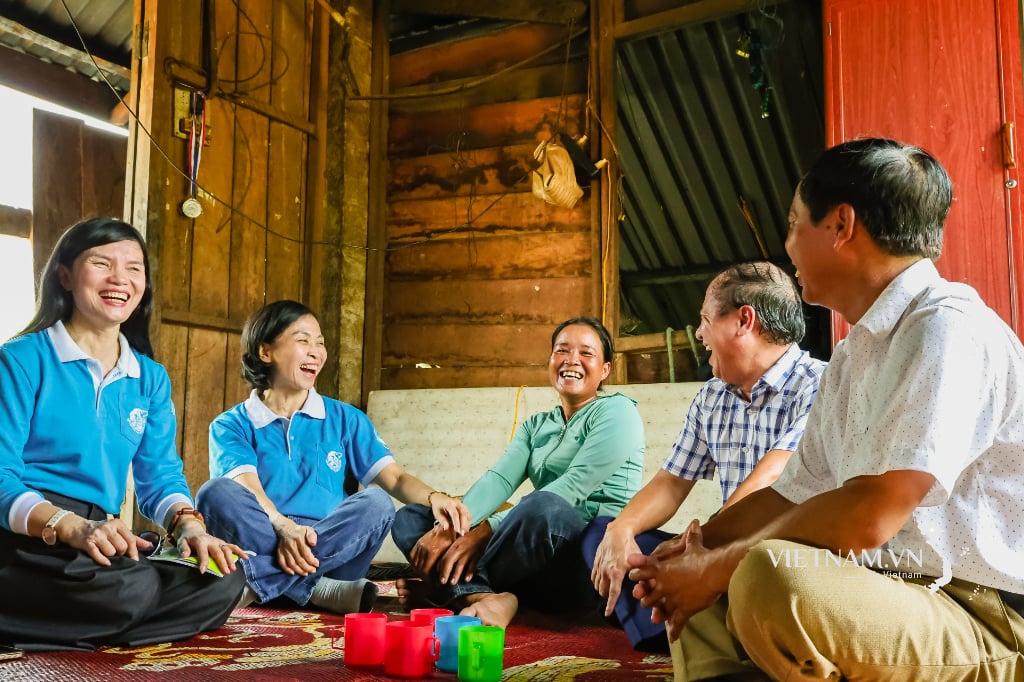If spelled correctly, Giàng means Heaven, the supreme deity in the beliefs of ethnic minorities in the Central Highlands. For them, the concepts of Giàng, Yàng, or Yang often encompass both Heaven and other deities. Giàng corresponds to the word for God/Supreme Being in Sanskrit (ईश्वर - Izvara), in Hebrew (אלוהים), or in Indonesian (Tuhan)...
Giàng is also a common surname among ethnic minorities in northern Vietnam, especially within the Hmong community, and has been recorded since the 19th century in Quốc ngữ (Vietnamese alphabet) directories based on the Hmong language.
In short, offering sacrifices is not the same as offering sacrifices to Heaven. So, what does "dàng" mean?
In the Thiên Nam ngữ lục ngoại kỷ written in Nôm script, there is a sentence: 會𣈙仕娓誦经供養 (Hội rày sãi vãi tụng kinh cúng dàng, p. 88a). Cúng dàng means "offering, presenting offerings." Dàng is the same as dưỡng (養) in Chinese, another pronunciation is dương. In other words, cúng dàng is a corrupted form of cúng dâng (供養), borrowed directly from Chinese, therefore dàng does not mean Heaven. Please note the spelling difference between the two words dàng and Giàng.
In Buddhism, offerings are symbolic gifts presented to the Three Jewels (Buddha, Dharma, Sangha). These offerings typically include candles, incense, bedding, fruits, food and drink, banners, and other solemn Buddhist items. Because monks are detached from external conditions during their practice, they cannot provide for themselves the necessities of life and need the assistance of lay Buddhists. Therefore, helping others to practice is helping others achieve enlightenment, and such offerings are considered meritorious.
It is common for Buddhists to use money to support monks or make offerings before Buddha statues. In the past, monks did not accept monetary offerings. After the Tang Dynasty in China, when the Zen Buddhist community established the Zen monastic system, monks were allowed to accept money. In Japan, this is called "pure money" (净财). Theravada Buddhism stipulates that monks are not allowed to possess gold, silver, or valuable possessions; all assets are managed by lay Buddhists ("pure people") (净人). Offering money before Buddha statues is called "donating to Buddha" (赕佛).
We can also clasp our hands together, kneel, or prostrate before the Buddhas and Sangha; this is called "respectful offering" (敬供養). Practicing the Five Precepts, the Ten Virtues, chanting sutras, reciting Buddha's name, or meditating, practicing meditation... are also forms of offering, called "practical offering."
(Offering of Dharma). Spreading the meaning of Buddhism to all sentient beings, helping them escape suffering and attain happiness, is called "offering of Dharma" (法供養). In Buddhism, there is also "offering of the body" (身供養), such as "burning fingers" or "burning the ring scar" on the heads of Han Chinese monks during the Song Dynasty, which are considered offerings of the body. For the general public, working to help the temple, contributing to the cause of Buddhism and the Sangha, is also considered an offering of the body.
Source link


![[Photo] General Secretary To Lam attends the inauguration ceremony of Si Pa Phin multi-level boarding school.](/_next/image?url=https%3A%2F%2Fvphoto.vietnam.vn%2Fthumb%2F1200x675%2Fvietnam%2Fresource%2FIMAGE%2F2026%2F01%2F31%2F1769840655651_ndo_br_z7486540481209-f37c7e00a962aec2a061c64b7db569ef-jpg.webp&w=3840&q=75)
























































































![OCOP during Tet season: [Part 3] Ultra-thin rice paper takes off.](/_next/image?url=https%3A%2F%2Fvphoto.vietnam.vn%2Fthumb%2F402x226%2Fvietnam%2Fresource%2FIMAGE%2F2026%2F01%2F28%2F1769562783429_004-194121_651-081010.jpeg&w=3840&q=75)


![OCOP during Tet season: [Part 2] Hoa Thanh incense village glows red.](/_next/image?url=https%3A%2F%2Fvphoto.vietnam.vn%2Fthumb%2F402x226%2Fvietnam%2Fresource%2FIMAGE%2F2026%2F01%2F27%2F1769480573807_505139049_683408031333867_2820052735775418136_n-180643_808-092229.jpeg&w=3840&q=75)





Comment (0)